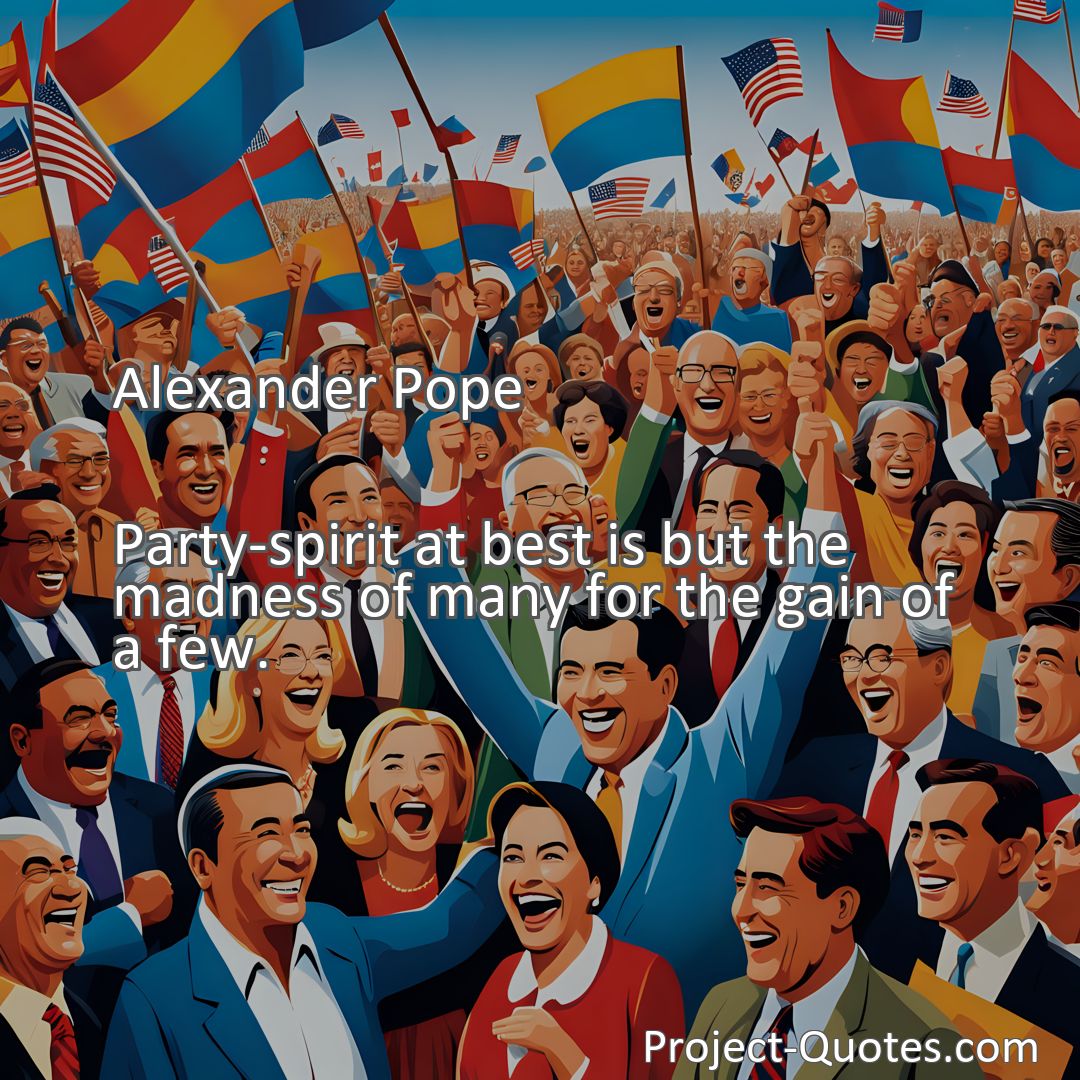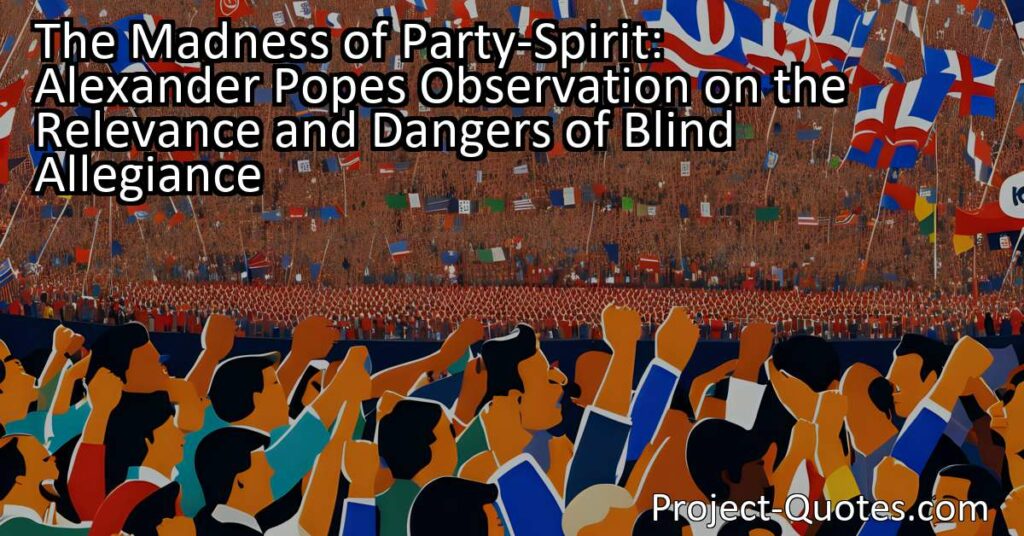Party-spirit at best is but the madness of many for the gain of a few.
Alexander Pope
Alexander Pope’s observation on the relevance of blind allegiance and the dangers of party-spirit holds significant relevance in today’s political landscape. When individuals become solely devoted to a particular party, they unknowingly empower a few individuals who benefit at the expense of the majority. This blind adherence to party ideologies hinders progress and fosters polarization, making it essential for citizens to rise above party-spirit, engage in critical thinking, and demand transparent and accountable leadership.
Table of Contents
Meaning of Quote – Party-spirit at best is but the madness of many for the gain of a few.
Party-spirit at best is but the madness of many for the gain of a few. – Alexander Pope
In the realm of politics, it is not uncommon to witness a fervent drive among individuals to align themselves with a particular party. We often find ourselves drawn into the excitement and passion that comes with being part of a political group. However, Alexander Pope, a renowned poet of the 18th century, suggests that this so-called “party-spirit” is nothing more than a collective delusion that benefits only a select few. This quote implies that when individuals become blinded by their allegiance to a party, they unknowingly contribute to the empowerment of a handful of individuals who reap the benefits while the majority suffer the consequences.
To truly unravel the meaning behind Pope’s words, it is important to examine the underlying factors that contribute to the formation and perpetuation of party-spirit. Human beings are inherently social creatures, seeking companionship and often forming groups based on shared interests or ideologies. When it comes to politics, these groups materialize in the form of political parties, each representing a set of ideas and promises that resonate with a particular segment of the population.
The allure of party-spirit arises from a sense of belonging and camaraderie. It provides individuals with a platform to voice their concerns, opinions, and aspirations while simultaneously feeling supported and validated by like-minded individuals. The sense of community that comes with being part of a political party can be empowering, as it fosters a collective identity and purpose. Thus, party-spirit can indeed be seen as a form of madness, but one that is deeply rooted in the desire for connection and significance.
However, while the social and emotional aspects of party-spirit may be appealing, Pope suggests that the true motivation for these parties lies in the pursuit of personal gain by a select few. Political parties often rely on the support and financial contributions of their members to maintain their influence and power. The dedicated efforts of the many result in the empowerment of a handful of individuals who hold key positions within the party hierarchy. These individuals manipulate the aspirations and convictions of their members to push their own agendas, often at the expense of the greater good.
Pope’s observation holds significant relevance in the contemporary political landscape. One needs to look no further than the various scandals and corruption allegations that have plagued political parties across the globe. Examples of leaders abusing their power for personal gain are all too common, reinforcing the notion that party-spirit is indeed a mechanism that benefits the few rather than the many.
Another aspect of party-spirit that Pope’s quote touches upon is the tendency for individuals to abandon critical thinking and blindly adhere to the beliefs of their chosen party. This blind allegiance can have dire consequences for societal progress. When party members become unwilling to engage in open and honest discussions with those who hold opposing views, a culture of polarization and division flourishes. Instead of seeking common ground and working towards the betterment of society, people become entrenched in their own echo chambers, perpetuating a cycle of hostility and animosity.
It is essential to recognize the dangers of party-spirit and the potential harm it can inflict upon the democratic process. While political parties were originally intended to provide representation and a voice for the people, their evolution has often resulted in a disconnect between the interests of the general public and the decisions made by party leaders. The madness of party-spirit blinds us to the fact that progress can only be achieved through open dialogue, compromise, and a commitment to the common good.
As citizens, it is crucial to rise above the madness of party-spirit and make informed decisions that transcend the boundaries of political affiliation. This requires us to critically evaluate the policies and actions of political parties rather than blindly accepting their rhetoric. It involves engaging in respectful discussions with individuals who hold different perspectives, fostering an environment where constructive discourse can thrive.
Additionally, we must hold our elected officials accountable for their actions and ensure that their decisions align with the values and needs of the majority. To truly combat the madness of party-spirit, we must demand transparency, ethical leadership, and a commitment to the equitable distribution of power and resources.
In conclusion, Alexander Pope’s quote serves as a sage reminder to all of us about the dangers of succumbing to party-spirit. While the sense of belonging and community that comes with aligning oneself with a political party may be enticing, it is important to recognize the potential pitfalls. When we blindly follow the ideologies of a few in exchange for a sense of identity, we inadvertently contribute to the perpetuation of a system that only benefits those in power. It is vital that we cultivate critical thinking, strive for genuine dialogue, and hold our elected officials accountable if we seek to overcome the madness of party-spirit and work towards a more inclusive and equitable society.
I hope this quote inspired image brings you hope and peace. Share it with someone who needs it today!


